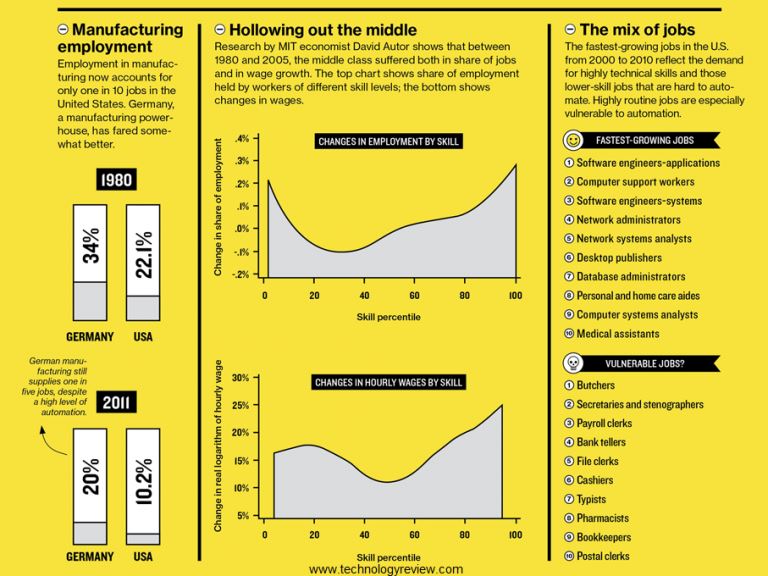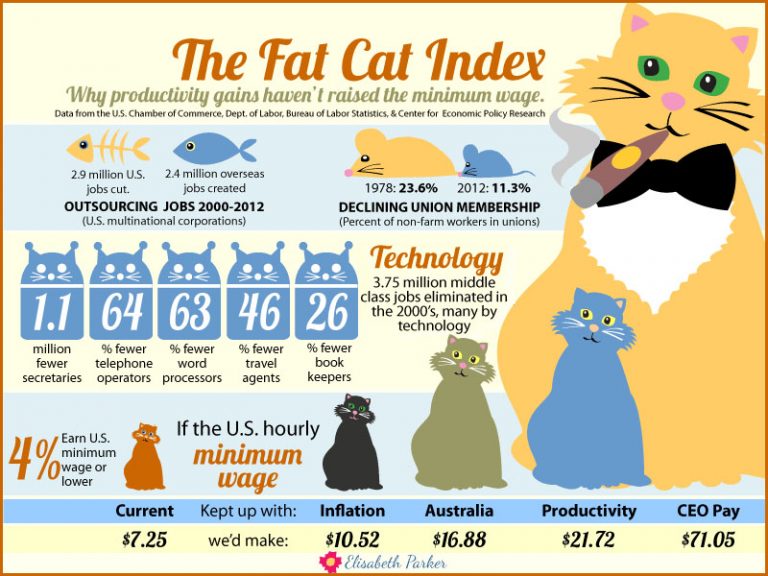Continues from previous page.

Technology, jobs, and the minimum wage: This chart from the MIT Technology Review shows the effect of technology on jobs and income inequality. Technology has eliminated many jobs that paid above the federal minimum wage. Image: Technology Review.
4. How technology helped lower the federal minimum wage.
Advances in computing and other technologies in the 1970’s, 80’s, 90’s, and 2000’s increased workers’ productivity immensely. American workers themselves also played a role in making themselves more productive, by embracing these new technologies. Unfortunately, technology — despite its early promise as an equalizer and prosperity engine — became another nail in the income inequality coffin. Those with computing smarts, resources, and a knack for catching on to new technologies saw huge salary increases. Stock options from legendary start-ups like Apple, Sun Microsystems and Microsoft often made their workers into millionaires.
At first, this prosperity spread somewhat evenly — at least if you lived near a major technology center like Silicon Valley, Boston, Seattle, or Research triangle. Even if you weren’t a programming genius, you could take some courses and land a well-paying assembly or technical support job. Stocks often rose so quickly that even administrative assistants and switchboard operators wound up with the down payment for a house. Who cares about the federal minimum wage when you’ve got stock options?
Who cares about the federal minimum wage? I’ve got stock options!
Technology also radically changed the underlying structure of how people work and how they think about work. Unions failed to keep up with these trends, as newly-minted “ knowledge-workers ” struck off confidently on their own, forgetting there’s often strength in numbers. Unions ran against the grain of the new breed of independent-thinking technical mavens who thought their PC’s and amazing brains were all they needed. Who wants to punch a clock, when HP pays handsomely, and even carts in dinner so you don’t have to look away from your code? Who wants to wear a uniform, when Google lets you schlep into your cubicle in just your flannel shirt, shabby khaki shorts, and flip-flops?
Then, the hard-ass CEOs like Carly Fiorina had to come along and ruin everything. Did you seriously think these predators would share the wealth for more than the two or three decades it took to persuade workers they no longer needed labor unions?
OOPS! Now that technology isn’t raining down the good jobs anymore, we sure wish the federal minimum wage were higher!
Yeah, the Google engineer’s still crunching code in his cubicle. Though now, his beard’s a bit fuller, his flannel shirt and khaki shorts are a bit more filled out, and he’s traded in his flip-flops for the ugliest pair of Crocs he can find. But the folks down the road in assembly and tech support got laid off a years ago, when their jobs were either automated or shipped overseas. Meanwhile, 58% of the new jobs created since the 2008 recession are in low-wage occupations. Too bad we were so busy frantically trying to stay employable — by constantly learning new stuff — to keep an eye on congress. A higher federal minimum wage would come in handy, now that we’re all working at Walmart and McDonald’s.
Just a few of the many middle class occupations hollowed out by technology.
Here’s a list of common, well-paying, skilled, middle class occupations — which paid well above the federal minimum wage — which have all but disappeared, thanks to technology [SOURCE: New York Daily News] :
- 1.1 million secretary jobs gone thanks to calendar apps., etc.
- 64% telephone operator jobs gone thanks to automated systems.
- 63% fewer word processing and typing jobs now that everyone can do it and the programs are so easy to use.
- 46% fewer travel agents thanks to Travelocity.
- 26% fewer book-keeping jobs thanks to Quicken and Excel.
NEXT: Outsourcing.

